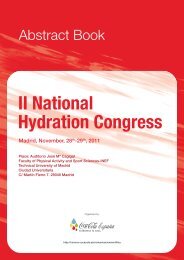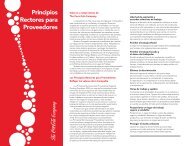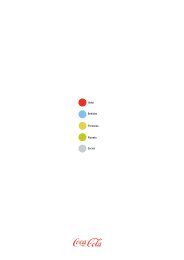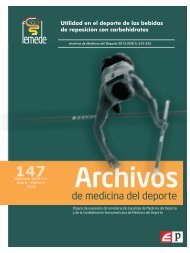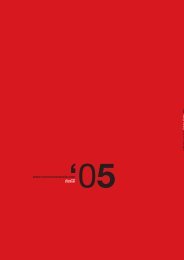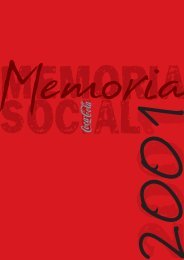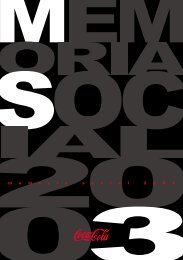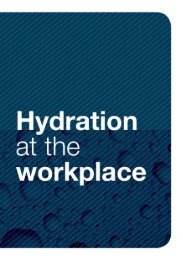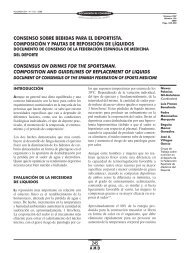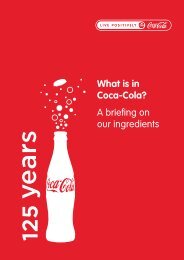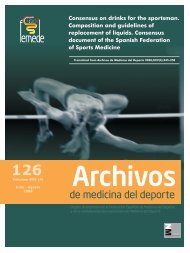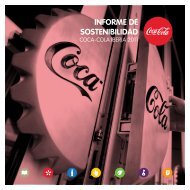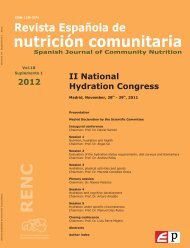athletes' medical information - Coca-Cola
athletes' medical information - Coca-Cola
athletes' medical information - Coca-Cola
You also want an ePaper? Increase the reach of your titles
YUMPU automatically turns print PDFs into web optimized ePapers that Google loves.
athletes’ <strong>medical</strong> <strong>information</strong><br />
Typically, when carbohydrate is consumed<br />
during exercise, it is best consumed in a pattern<br />
of frequent and continued intake. This will<br />
provide a constant stimulation of the brain and<br />
central nervous system, or when needed, a<br />
constant source of additional fuel for the<br />
muscle.<br />
Sodium should be included in fluids<br />
consumed during exercise lasting longer than<br />
1-2 hours or by individuals during any event<br />
that stimulates heavy sodium loss (i.e., more<br />
than 3-4 grams of sodium, see next page for<br />
assessment).<br />
Caffeine contained in commonly available<br />
beverages and foods can enhance endurance<br />
or performance during the later stages of<br />
prolonged exercise. This benefit can be<br />
obtained with relatively small doses of caffeine<br />
(about 2-3 mg/kg bodyweight or 100-200 mg<br />
caffeine). This is equivalent to 1-2 cups of<br />
brewed coffee or 750-1500 ml of cola<br />
beverages as commonly consumed by people of<br />
various cultures. Various sports products (gels,<br />
drinks, etc.) may also provide a convenient<br />
low-dose serving of caffeine.<br />
Rehydration after exercise<br />
Replacement of water and the salts lost in<br />
sweat is an essential part of the recovery<br />
process. Since sweat and urine losses continue<br />
to occur during recovery, the athlete will need to<br />
drink about 1.2-1.5 litres of fluid for each kg of<br />
weight loss in training or competition to<br />
compensate and fully restore fluid losses.<br />
Sodium, the main salt lost in sweat, also<br />
needs to be replaced. Sodium replacement can<br />
be achieved via sodium-containing fluids such<br />
as sports drinks and pharmacy oral rehydration<br />
solutions. However, simply a meal or snack can<br />
supply the salt that is needed. This may be<br />
because the foods are salt-containing (e.g.,<br />
breads, breakfast cereals, cheese, processed<br />
meats) or because salt is added in the<br />
preparation or serving of the meal.<br />
Recovery after exercise is part of the<br />
preparation for the next exercise session, and<br />
rehydration should be considered as an<br />
important part of the equation.<br />
Special strategies<br />
Athletes who have dehydrated to make weight<br />
will need special strategies for drinking before<br />
and during competitions to optimise<br />
performance. These athletes will benefit from<br />
the advice of a qualified and experienced sports<br />
nutrition professional.<br />
Athletes training and competing while<br />
practising fasting during the month of Ramadan<br />
must rehearse a hydration strategy that<br />
preserves performance and protects health.<br />
Just like new shoes, don’t try out new<br />
plans for fluid and fuel intake during an<br />
important competition. Do it in practice<br />
and find what fits you best.<br />
25<br />
12-113-COC_Paralymics_Booklet_20120718.indd 25<br />
7/18/12 4:29 PM



